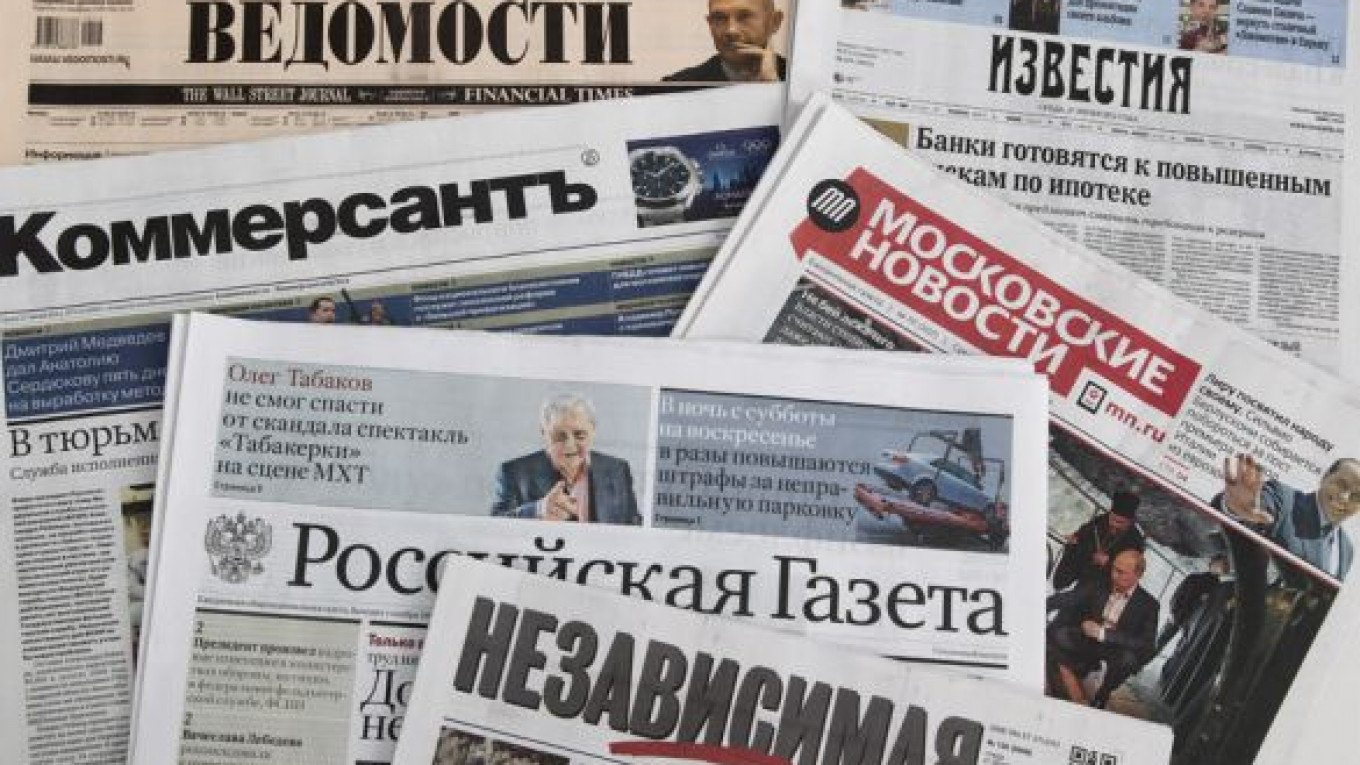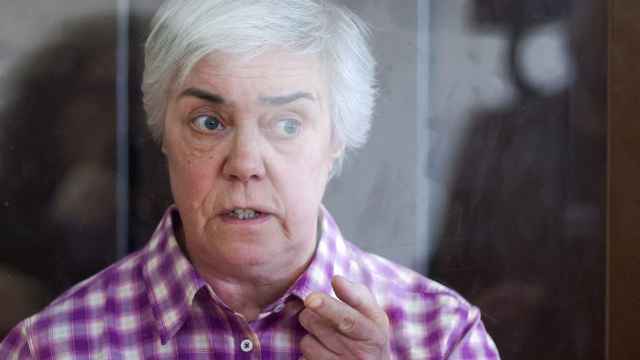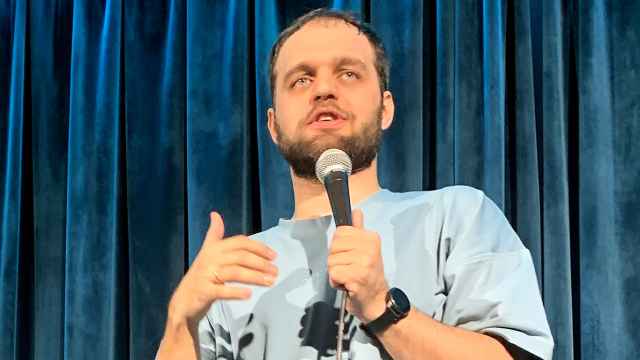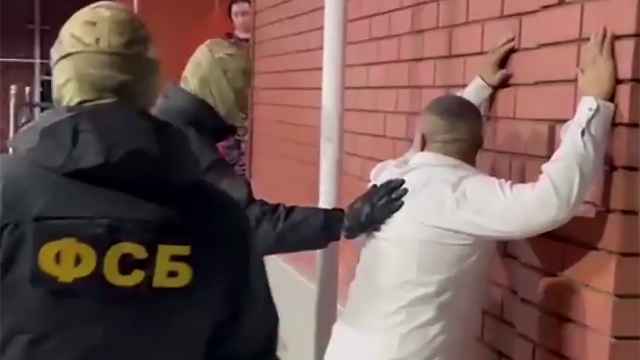Kommersant
1. Alexandra Chernykh and Ksenia Osipenko article headlined "Rosobrnadzor head passes single state exam" says Rosobrnadzor (Russian education watchdog) head Ivan Muravyev is said to be going to step down from the post due to the failure of the school leaving exams campaign this year; pp 1, 5 (773 words).
2. Dmitry Butrin et al. report headlined "Ministries offered to share with Rosimushchestvo" outlines the corporate management reform being discussed in the government. It envisages the sale of small state-controlled corporations, the handover of control functions from government bodies to Rosimushchestvo, federal property agency, and transparency in voting for the chairmen of the boards of directors of these companies; pp 1-2 (1,012 words).
3. Yelena Chernenko article headlined "Exchange rate being set for spies" says the German couple jailed for spying for Russia is to be exchanged with Moscow for some Western agents; pp 1, 6 (769 words).
4. Yevgeny Timoshinov article headlined "Budget to take a ride to Kazan" says the Russian Railways have calculated the amount of investments, 650 billion rubles (around $19.6 billion), to be made in the construction of a high-speed railway lining Moscow with Kazan. The railway will also require state support when functioning in order to make tickets affordable for most Russians; pp 1, 7 (672 words).
5. Ivan Safronov and Anna Pushkarskaya article headlined "Defense Ministry diverts all suspicions from itself" says Spetstroi (Federal Agency for Special Construction Projects) head Grigory Naginskyis to resign as Defense Minister Sergei Shoigu wants to get rid of officials questioned as part of the Oboronservis corruption case. First Deputy Emergency Situations Minister Alexandra Volosov may take the post of Naginskiy, the article says; p 3 (780 words).
6. Anna Makeyeva article headlined "Marseillaise with departure" says the French ambassador to Russia, Jean de Gliniasty, has given the last reception in Moscow before leaving the country. The name of the new diplomat to take the post is still unknown; p 5 (527 words).
7. Maxim Yusin article headlined "Syrian revolutionaries snatching weapons from each other" says clashes are breaking out among Syrian rebels fighting with each other for greater influence. The situation shows the danger of handing over Western weapons to the Syrian opposition, the article says; p 6 (378 words).
8. Kabay Karabekov article headlined "SCO expects enlargement" says the Shanghai Cooperation Organization (SCO) is getting ready for NATO troops withdrawal from Afghanistan. Foreign ministers of the SCO member-states gathered in Kyrgyzstan to discuss the possibility of the accession of Iran, Pakistan and India to the organization; p 6 (321 words).
9. Kirill Belyaninov article headlined "Edward Snowden's asylum slaps door" says Latin American countries are recalling their ambassadors from Spain, France, Italy and Portugal following the scandal with the Bolivian presidential plane; p 6 (335 words).
10. Olga Kuznetsova article headlined "Egypt lacks money for bread" says Russia may offer a loan to Egypt which is on the verge of an economic catastrophe; p 6 (408 words).
Nezavisimaya Gazeta
1. Konstantin Remchukov article headlined "Horizontal people" analyses the current political and economic trends and says that globalization made Russians aware of high living standards that is why "horizontal people" are not ready to wait for better life and want their living standards to improve right now; pp 1, 3 (1,085 words).
2. Vladimir Skosyrev and Darya Tsilyurik article headlined "Edward Snowden's secret weapon" reports on recent revelations by U.S. whistle-blower Edward Snowden and notes that Washington accused Moscow of offering Snowden a platform for anti-U.S. propaganda; pp 1, 6 (787 words).
3. Alexandra Samarina article headlined "Pugachyov riot: repetition of previously learnt" says the Prosecutor General's Office has opened a public reception office in Pugachyov following protests there. Experts believe the situation in the town shows the failure of the law-enforcement agencies to deal with ethnic crime; pp 1, 3 (977 words).
4. Igor Naumov article headlined "Agricultural Ministry aimed at fighting against inflation" says the authorities have decided that the agricultural sector will give a boost to the country's economic development. The author, however, notes that the agricultural sector accounts only for 7 percent of the Russian economy; pp 1, 4 (809 words).
5. Sergei Kulikov article headlined "Russia reveals oil secrets" says the volume of oil deposits made public by the authorities tunes out to be 30 percent larger than the West previously expected; pp 1, 4 (595 words).
6. Yevgenia Novikova article headlined "Ex-president Morsi accused of spying and ruining economy" says Egypt is going to try yet another president. Morsi is accused of spying, ruining the Egyptian economy and inciting violence; pp 1, 6 (506 words).
7. Editorial headlined "Waiting for Armata" comments on the re-armament of the Armed Forces and notes that upbeat reports by senior officials are far from the real situation in military units; p 2 (564 words).
8. Vladimir Mukhin article headlined "Troops ordered to go to East" reports on the large-scale surprise exercise of the Eastern and Central military districts; p 2 (756 words).
9. Viktoria Panfilova article headlined "Manas to get rid of American flag" says the U.S. air base in Bishkek is to be closed in July 2014. Moscow is expected to compensate the Kyrgyzstan government's losses due to the closure of the U.S. facility by supplying more gas and weapons; p 6 (751 words).
Vedomosti
1. Natalya Bianova et al. report headlined "Reputation more valuable than owners" says Russian banks whose co-owners are suspected by the police of the involvement in illegal cash withdrawal and money laundering have decided to get rid of these shareholders; pp 1, 14 (610 words).
2. Polina Khimshiashvili et al. report headlined "Snowden not to do harm" says State Duma chairman Sergei Naryshkin and Federation Council speaker Valentina Matviyenko have called for providing U.S. whistle-blower Snowden with asylum. Experts believe the Russian stance is unlikely to spoil the relations between Moscow and Washington; pp 1-2 (722 words).
3. Editorial headlined "Miracle on Volga" says the large number of medals Russian athletes have won in Kazan should compensate for the huge expenses on the World University Games in the city, the organizers believe; pp 1, 6 (496 words).
4. Lilia Biryukova and Maxim Glikin article headlined "Blogger under supervision" says United Russia lawmakers want to pass a law making popular internet blogs equal to media to keep them under control; p 2 (665 words).
5. Editorial headlined "Mourning on roads" comments on a grave road accident in Moscow Region which left 18 people dead; p 6 (325 words).
6. Alexei Nikolsky article headlined "Person of week: Edward Snowden" says Edward Snowden's case shows that a single person is still capable of changing history. Snowden's stay at Sheremetyevo Airport may further spoil the Russian-U.S. relations, the article notes; p 7 (326 words).
7. Olga Kuvshinova and Mikhail Malykhin interview with Labor Minister Maxim Topilin speaking on the pension reform, medical insurance for migrant workers and personnel cuts at AvtoVAZ car manufacturer; pp 8-9 (3,416 words).
Izvestia
1. Marina Davydova article headlined "Unified State Exam marks of school leavers from powerful families being checked in Ossetia" says the law-enforcement agencies have started a probe into the Unified State Exam held in North Ossetia where children of officials and businessmen fell ill and scored high marks at the exams held for them separately; pp 1, 4 (639 words).
2. Andrei Gridasov article headlined "Policemen let offenders of deputy Khudyakov go back in March" says an investigation has found out that the Dagestani natives who attacked State Duma MP Roman Khudyakov used to extort 30 million rubles (nearly $1 million) from a Moscow businessmen, however, the case was closed due to formalities; pp 1, 4 (594 words).
3. Viktor Sokirko article headlined "Armed Forces gain weight" says Russian conscripts are now gaining weight much faster than five years ago; pp 1, 5 (618 words).
4. Article by political scientist Boris Mezhuiyev headlined "Rights activists and libertarians" calls for granting Edward Snowden asylum in Russia as a whistle-blower is not a "traitor"; pp 1, 4 (885 words).
5. Natalya Savisko article headlined "Snowden afraid to fly to Latin America" says following the scandal with the Bolivian presidential plane U.S. whistle-blower Edward Snowden has decided to seek political asylum in Russia; p 4 (600 words).
6. Yury Matsarsky and Mikhail Fomichev article headlined "Muslim Brotherhood do not stop protests even during Ramadan" says the Egyptian Islamists are not going to give up and pledge to continue protests in support of ex-president Morsi; p 7 (857 words).
Rossiiskaya Gazeta
1. Yury Gavrilov article headlined "Conscripts do not grow younger" details some changes in military call up in Russia; pp 1-2 (580 words).
2. Yury Gavrilov article headlined "Urgent message from General Staff" comments on large-scale operational readiness tests in the Eastern and Central military districts; p 2 (450 words).
3. Vladislav Vorobyov article headlined "They listen but do not hear" says the U.S. authorities who stripped Edward Snowden of the U.S. citizenship are to blame for his delayed stay in Moscow, since it is hard for him to leave to Venezuela which is ready to provide him with political asylum; p 5 (517 words).
4. Article by Fedor Lukyanov, chairman of the presidium of the Foreign and Defense Policy Council, headlined "Snowden to stay with us for long" says Snowden has created a large number of foreign policy problems to Russia and notes that it would be beneficial both to Moscow and Washington if he left to Latin America; p 5 (716 words).
Novaya Gazeta
1. Nadezhda Prusenkova interview with Pavel Chikov, head of Agora human rights NGO, speaking on the persecution of NGOs and political situation in Russia; p 9 (1,360 words).
Noviye Izvestia
1. Vera Moslakova article headlined "Under surveillance of authorities" reviews recent bills aiming to take private life of Russians under control and notes that the authorities risk going too far when people will protest against their intervention; pp 1-2 (1,386 words).
2. Yulia Savina interview with Sergei Nikitin, director of the Russian branch of Amnesty International NGO, speaking on the recent meeting with U.S. whistle-blower Edward Snowden and prospects for granting him with asylum; pp 1-2 (682 words).
Moskovsky Komsomolets
1. Mikhail Rostovsky article headlined "Why does Russia need Snowden?" says Russia is to give asylum to U.S. whistle-blower Edward Snowden to take revenge on the U.S.; pp 1-2 (600 words).
2. Article by economic expert Yevgeny Gontmakher headlined "Pension of protest" criticizes the new pension reform developed by the government and predicts that it will give rise to mass protests if the reform is passed; p 3 (750 words).
3. Tatyana Melikyan article headlined "What future mayor prepares for us" reviews election platform of Moscow mayoral hopefuls; p 4 (1,100 words).
A Message from The Moscow Times:
Dear readers,
We are facing unprecedented challenges. Russia's Prosecutor General's Office has designated The Moscow Times as an "undesirable" organization, criminalizing our work and putting our staff at risk of prosecution. This follows our earlier unjust labeling as a "foreign agent."
These actions are direct attempts to silence independent journalism in Russia. The authorities claim our work "discredits the decisions of the Russian leadership." We see things differently: we strive to provide accurate, unbiased reporting on Russia.
We, the journalists of The Moscow Times, refuse to be silenced. But to continue our work, we need your help.
Your support, no matter how small, makes a world of difference. If you can, please support us monthly starting from just $2. It's quick to set up, and every contribution makes a significant impact.
By supporting The Moscow Times, you're defending open, independent journalism in the face of repression. Thank you for standing with us.
Remind me later.






